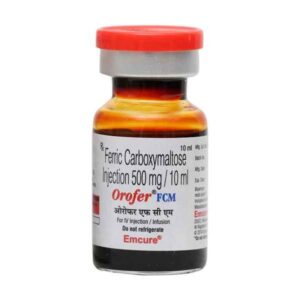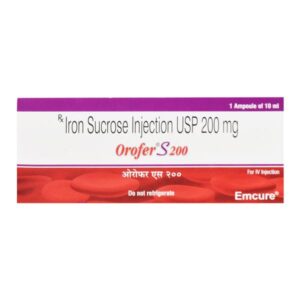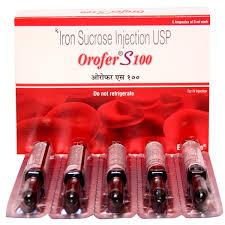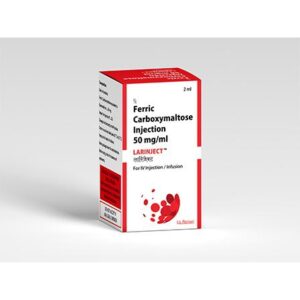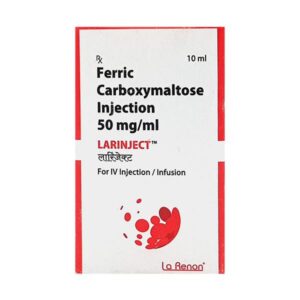VIT B12 + B6 + FE 3 HYDROXIDE POLYMALTOSE COMPLEX
Vit B12: Drug: Vitamin B12 (also known as Cyanocobalamin)
Use: Vitamin B12 is a water-soluble vitamin that plays a crucial role in the functioning of the nervous system and the production of DNA and red blood cells. It is used to treat or prevent vitamin B12 deficiency caused by conditions such as pernicious anemia, malabsorption issues, and certain vegetarian or vegan diets. Additionally, it may be prescribed for other purposes such as boosting energy levels and supporting cognitive function.
Mechanism of Action: Vitamin B12 acts as a coenzyme in various biochemical reactions in the body. It is involved in the conversion of methylmalonyl-CoA to succinyl-CoA, a key step in the metabolism of fatty acids and amino acids. It also participates in the methylation of homocysteine to methionine, which is essential for DNA synthesis and the production of neurotransmitters.
Dose: The recommended dose of Vitamin B12 varies depending on the individual’s age, medical condition, and the severity of the deficiency being treated. Common dosages range from 250-1000 micrograms per day. It can be administered orally in the form of tablets, sublingually (under the tongue), intramuscularly as an injection, or as a nasal spray. It is important to follow the instructions provided by the healthcare professional or read the product label carefully.
Side Effects: Vitamin B12 is generally safe when taken in recommended doses, and side effects are rare. However, some individuals may experience mild side effects such as headache, nausea, upset stomach, or diarrhea. Allergic reactions to vitamin B12, though extremely rare, may manifest as itching, swelling, dizziness, or difficulty breathing. If any severe or persistent side effects are experienced, it is recommended to seek medical attention promptly.
Note: It is advisable to consult a healthcare professional for specific dosage recommendations and to discuss any potential interactions or contraindications with other medications or medical conditions.
B6: Drug: B6 (Pyridoxine)
Use: B6, also known as pyridoxine, is a vitamin that is essential for various bodily functions. It is used as a dietary supplement to treat or prevent vitamin B6 deficiency, which can occur due to poor diet or certain medical conditions. B6 is also used for the treatment of certain medical conditions like anemia, neuropathy, premenstrual syndrome (PMS), and morning sickness during pregnancy.
Mechanism of Action: Pyridoxine is a water-soluble vitamin and acts as a coenzyme in numerous biochemical reactions in the body. It plays a crucial role in metabolizing proteins, carbohydrates, and fats. Specifically, it is involved in the synthesis of neurotransmitters like serotonin, dopamine, and gamma-aminobutyric acid (GABA), which regulate mood, sleep, and other brain functions.
Dose: The dosage of B6 varies depending on the specific condition being treated. For preventing or treating vitamin B6 deficiency in adults, the recommended daily dose is 2-2.5 mg. However, for certain medical conditions, higher doses might be prescribed under medical supervision.
Side Effects: When taken at recommended doses, vitamin B6 is generally considered safe and does not usually cause any adverse effects. However, high doses of B6 above the recommended daily intake (more than 200 mg per day) can lead to peripheral neuropathy, causing numbness, tingling, and loss of sensation in the hands and feet. Long-term use of high doses may also result in skin lesions and gastrointestinal disturbances. It is essential to follow the recommended dosage and consult a healthcare professional before taking B6 supplements.
Fe 3 Hydroxide Polymaltose Complex: Fe 3 Hydroxide Polymaltose Complex, also known as iron polymaltose complex, is a medication used to treat iron deficiency anemia. It is available in oral and intravenous formulations and is primarily prescribed when oral iron preparations are ineffective or not tolerated.
The mechanism of action of Fe 3 Hydroxide Polymaltose Complex involves replenishing iron stores in the body. Iron is an essential mineral that plays a vital role in the production of red blood cells, which carry oxygen to all body tissues. In iron deficiency anemia, there is a lack of iron to produce enough healthy red blood cells, resulting in fatigue, weakness, and other symptoms. Fe 3 Hydroxide Polymaltose Complex provides a stable supply of iron to the body, allowing for the production of new red blood cells and improvement in anemia symptoms.
The dose of Fe 3 Hydroxide Polymaltose Complex varies depending on the severity of the anemia and individual patient factors. For oral formulation, a typical starting dose is 100-200 mg of elemental iron per day, which can be increased if necessary. The intravenous formulation is administered by a healthcare professional and the dose is determined based on the patient’s weight and iron deficit.
Common side effects of Fe 3 Hydroxide Polymaltose Complex include gastrointestinal symptoms such as nausea, vomiting, constipation, and diarrhea. These side effects are usually mild and transient. Allergic reactions can rarely occur and may manifest as itching, rash, or difficulty breathing. If any such symptoms occur, medical attention should be sought immediately.
It is important to note that Fe 3 Hydroxide Polymaltose Complex may interact with certain medications, such as antacids, antibiotics, and tetracycline derivatives, reducing their efficacy. Therefore, it is recommended to take these medications at least 2 hours before or 4-6 hours after taking Fe 3 Hydroxide Polymaltose Complex.
Overall, Fe 3 Hydroxide Polymaltose Complex is an effective treatment for iron deficiency anemia, providing a stable and well-tolerated source of iron to replenish the body’s iron stores. However, it is essential to follow the prescribed dosage and monitor for any potential side effects or drug interactions under the guidance of a healthcare professional.

